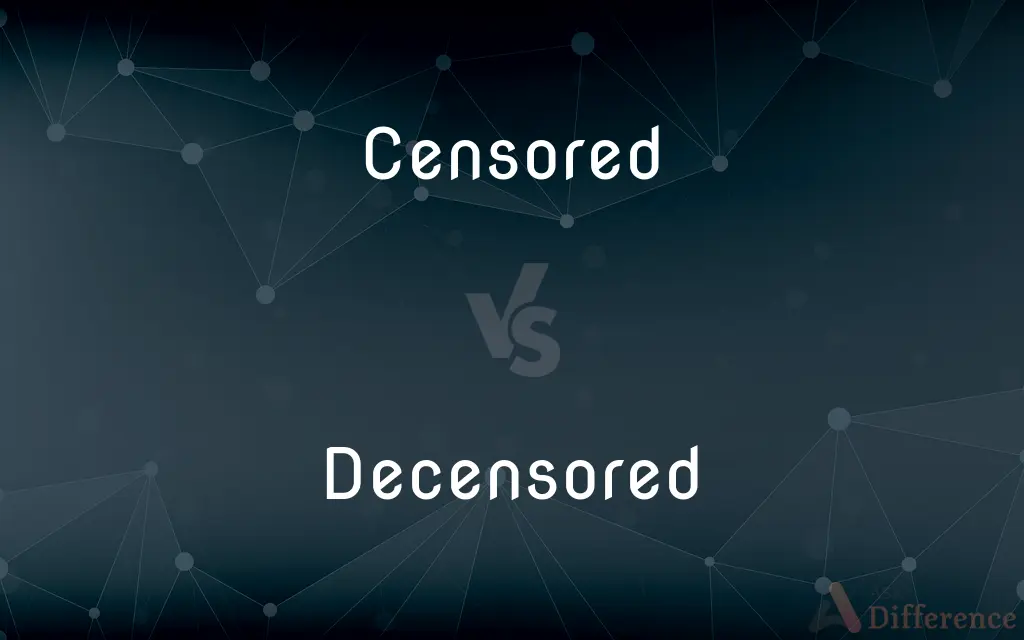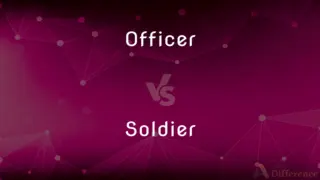Censored vs. Decensored — What's the Difference?
Edited by Tayyaba Rehman — By Urooj Arif — Updated on April 3, 2024
Censored refers to the suppression or omission of content deemed inappropriate, while decensored involves restoring or revealing previously censored material.

Difference Between Censored and Decensored
Table of Contents
ADVERTISEMENT
Key Differences
Censored content is material that has been altered, suppressed, or removed because it is considered objectionable, sensitive, or inconvenient by authorities, typically involving government, media outlets, or other controlling bodies. This process aims to restrict information deemed harmful or inappropriate for certain audiences. On the other hand, decensored content has undergone a process to remove or lift the restrictions previously imposed, making the original material accessible once again. This often involves restoring parts of artworks, publications, or media that were previously hidden or altered due to censorship.
The act of censoring can apply to various media forms, including books, films, news articles, and social media posts, where content is modified or blocked to adhere to specific regulations, moral standards, or political agendas. Decensoring, however, is the reversal of this process, aiming to bring the content back to its original state, often to preserve artistic integrity or promote transparency and freedom of expression.
Censorship is a tool used by governments, institutions, and organizations to control the dissemination of information and protect the public from what are considered harmful or inappropriate materials. Conversely, decensoring is frequently driven by movements or individuals advocating for rights to information, freedom of speech, and artistic expression, challenging the reasons and justifications behind censorship decisions.
While censored materials are subject to legal and societal controls that dictate their modification or suppression, decensored works often emerge from efforts to resist such controls, reflecting changes in societal norms, values, or legal frameworks that allow for the reevaluation and liberation of previously restricted content.
The implications of censoring and decensoring extend beyond the immediate modification of content, affecting public discourse, cultural norms, and the collective understanding of history and morality. While censorship can reflect and enforce prevailing power structures and values, the process of decensoring can serve as a catalyst for cultural and political change, challenging established narratives and encouraging a more open and inclusive dialogue.
ADVERTISEMENT
Comparison Chart
Definition
Alteration, suppression, or omission of content deemed inappropriate.
Restoration or revealing of content previously censored.
Purpose
To restrict access to harmful or sensitive information.
To promote transparency and restore original content.
Driven by
Authorities, regulations, moral standards.
Advocacy for freedom of expression and access to information.
Applies to
Books, films, news, social media, etc.
Same media forms where original content is restored.
Legal and Social Context
Enforced through laws, social norms, or institutional policies.
Often emerges from changing norms or legal rulings.
Implications
Can limit freedom of expression and access to information.
Can challenge censorship, encouraging openness and dialogue.
Compare with Definitions
Censored
Controlled by authorities.
Censored materials often reflect government restrictions.
Decensored
Restored to original state.
The decensored artwork revealed previously hidden details.
Censored
Modified due to regulations.
The article was censored for sensitive content before publication.
Decensored
Freed from restrictions.
Decensored documents were finally released to the public.
Censored
Subject to suppression.
The censored version of the movie omitted several scenes.
Decensored
Reclaimed for artistic integrity.
The director's cut was decensored for the re-release.
Censored
Withheld from public view.
Certain historical documents remain censored for security reasons.
Decensored
Unveiled after suppression.
The film was decensored and shown in its entirety.
Censored
Altered for moral reasons.
Offensive language in the book was censored.
Decensored
Made fully accessible.
Decensored archives offer a more complete historical record.
Censored
A person authorized to examine books, films, or other material and to remove or suppress what is considered morally, politically, or otherwise objectionable.
Decensored
Simple past tense and past participle of decensor
Censored
An official, as in the armed forces, who examines personal mail and official dispatches to remove information considered secret or a risk to security.
Censored
One that condemns or censures.
Censored
One of two officials in ancient Rome responsible for taking the public census and supervising public behavior and morals.
Censored
(Psychology) The component of the unconscious that is posited by psychoanalytic theory to be responsible for preventing certain thoughts or feelings from reaching the conscious mind.
Censored
To examine and expurgate.
Censored
Having had objectionable content removed.
Gory violence is usually censored.
Censored
Simple past tense and past participle of censor
Censored
Suppressed or subjected to censorship; as, the censored press in some countries. Opposite of uncensored.
Censored
Suppressed or subject to censorship;
The censored press in some countries
Common Curiosities
What does it mean to censor content?
To censor content means to modify, suppress, or remove material deemed inappropriate or harmful by authorities or regulations.
What is decensoring?
Decensoring is the process of removing censorship from previously suppressed or altered content, restoring it to its original form.
How is decensored content made available?
Decensored content becomes available through efforts to challenge initial censorship, often driven by changes in societal norms or legal judgments.
Can censorship affect freedom of expression?
Yes, censorship can limit freedom of expression by controlling which information is accessible and how it is presented.
Is decensoring always legal?
Decensoring depends on the legal and societal context; it may involve legal challenges or changes in censorship laws and policies.
Who decides what content is censored or decensored?
Decisions on censorship and decensoring are made by governments, regulatory bodies, institutions, and, in some cases, public advocacy influences decensoring.
What types of media can be censored?
Books, films, news articles, social media posts, and any form of communication can be subject to censorship.
Why is content censored?
Content is censored to comply with legal standards, moral values, political sensitivities, or to protect individuals from perceived harmful information.
How does the digital age affect censorship and decensoring?
The digital age complicates censorship and decensoring by enabling wider dissemination of content and more dynamic debates about its control.
How do creators respond to censorship?
Creators may challenge censorship through legal means, public advocacy, or by finding alternative ways to disseminate their work.
Does decensoring alter the original content?
Decensoring aims to restore the original content, removing alterations made during the censorship process.
Can something be partially decensored?
Yes, content can be partially decensored, with some, but not all, previously censored material being restored or made public.
What role do public opinion and activism play in decensoring?
Public opinion and activism can significantly impact decensoring efforts by challenging the rationale for censorship and advocating for access to unaltered information.
Can censorship vary between countries?
Absolutely, censorship standards and practices vary significantly between countries, reflecting differences in legal systems, cultural norms, and political climates.
Are there ethical considerations in decensoring content?
Yes, ethical considerations in decensoring involve balancing freedom of information with respect for privacy, security, and sensitivity to potentially harmful content.
Share Your Discovery

Previous Comparison
Yacht vs. Boat
Next Comparison
Officer vs. SoldierAuthor Spotlight
Written by
Urooj ArifUrooj is a skilled content writer at Ask Difference, known for her exceptional ability to simplify complex topics into engaging and informative content. With a passion for research and a flair for clear, concise writing, she consistently delivers articles that resonate with our diverse audience.
Edited by
Tayyaba RehmanTayyaba Rehman is a distinguished writer, currently serving as a primary contributor to askdifference.com. As a researcher in semantics and etymology, Tayyaba's passion for the complexity of languages and their distinctions has found a perfect home on the platform. Tayyaba delves into the intricacies of language, distinguishing between commonly confused words and phrases, thereby providing clarity for readers worldwide.











































